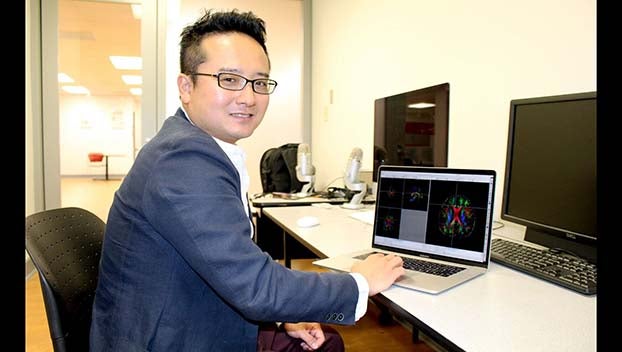Ole Miss researchers link brain matter to impulsiveness
Published 4:50 pm Monday, December 31, 2018

- Tossi Ikuta
TosOXFORD – Researchers in the School of Applied Sciences at the University of Mississippi have discovered an anatomical link in the human brain associated with impulsivity.
“Impulsivity is the tendency of your behavior to make decisions based on what you see in front of you, rather than seeing the entire picture,” said Tossi Ikuta, assistant professor of communication sciences and disorders and first author of the breakthrough study “White matter integrity in the fronto-striatal accumbofrontal tract predicts impulsivity,” recently published in the journal Brain Imaging and Behavior.
“So if you see something you want in front of you, do you buy it? You would consider your financial situation of this week or this month and make a decision. If you don’t do that and you just buy it – that is high impulsivity behavior.”
Some high impulsivity behaviors are associated with high behavioral risks, including taking illegal drugs or driving very fast.
Ikuta translated previous animal studies by using human MRI data to confirm what previous research has shown to be true in animal models: the strength of the connection between the brain’s pre-frontal cortex and the nucleus accumbens is a good indicator of impulsivity. The nucleus accumbens is a major component of the brain’s reward center.
“Previously this projection from the frontal lobe to the nucleus accumbens has been known to be associated to impulsivity in rodents,” Ikuta said. “Our colleague, Dr. Alberto del Arco, did a study with rodents showing this projection from the pre-frontal cortex to the nucleus accumbens and associated with dopamine release at the nucleus accumbens.
“We knew that there is the same structure in humans, too, but we are the first people who extracted this particular tract in humans. We took that part of the brain made by white matter, and we took the strength of this connection, and we compared this with people’s impulsivity.”
Ikuta explained that a stronger connection between the pre-frontal cortex and the nucleus accumbens is associated with higher impulsivity because of the enhanced reward processing at the nucleus accumbens.
“Just by looking at the MRI data, we cannot tell by our eyes that this is the connection in these two regions,” Ikuta said. “I wrote a script, a (computer) program, to extract this particular connection between these two regions.
“In the end, we have this structure, as you see in the paper. In each individual, we are able to extract this particular part of the brain, which is the accumbofrontal tract, and this, according to our results is associated with impulsivity.”
Ikuta is well known for replicating and translating animal studies with human MRI data.
“We have so many neuroscience studies done in animal models,” he said. “My interest is to translate what we know from rodent or primate studies and translate them into human brain using human brain MRI data that were already collected.
“I have interest in disorders such as Alzheimer’s, schizophrenia, Parkinson’s, autism, ADHD and other neurological or psychiatric disorders. Using brain MRI from humans, I can tell what is different from people with these disorders and without these disorders.”
Ikuta and his fellow researchers in the School of Applied Sciences are dedicated to improving human health and well-being.
“We are trying to deliver science into practice, and what I do is part of that,” Ikuta said. “I do science in the way that we can translate science into practice, and this time I’m translating rodent findings into human brain.
“It’s on the way from the bench using animals to (bedside) in a medical practice where we try to use our knowledge for health and medicine.”
Researchers in the School of Applied Sciences often conduct interdisciplinary research across departments. In this study, Ikuta brought insights from the Department of Communication Sciences and Disorders, while associate professor Alberto del Arco contributed his research from the Department of Health, Exercise Science and Recreation Management.
“Dr. Ikuta published several other articles in 2018, including one titled ‘Joint attention in Down Syndrome: A meta-analysis,'” said Vishakha Rawool, chair and professor of communication sciences and disorders. “It was published in collaboration with several investigators, including an investigator from our department and three other articles related to the relationship between physical activity and neural function, which were published in collaboration with investigators from the Department of Health, Exercise Science and Recreation Management within the School of Applied Sciences.”
The university community is committed to neurological research through its Flagship Constellations initiative, which seeks to find meaningful solutions through multidisciplinary response to health and social issues affecting Mississippi communities, the nation and the world. One of those constellations is Brain Wellness, which works to develop technologies and evidence-based practices that bolster prevention of and recovery from brain impairment.
Researchers from the School Applied Sciences involved in this Flagship Constellation include Ikuta, del Arco and David H. Holben, professor of nutrition and hospitality management.
“It is very exciting to see the outcomes of applied science researchers involved in translational research in areas that overlap multiple diseases illuminating new areas of knowledge that could eventually lead to more precise diagnostic, therapeutic and preventive protocols that can improve the lives of millions of people,” said Teresa Carithers, the school’s interim dean.
For more information about the School of Applied Sciences, visit http://sas.olemiss.edu/.
More News





